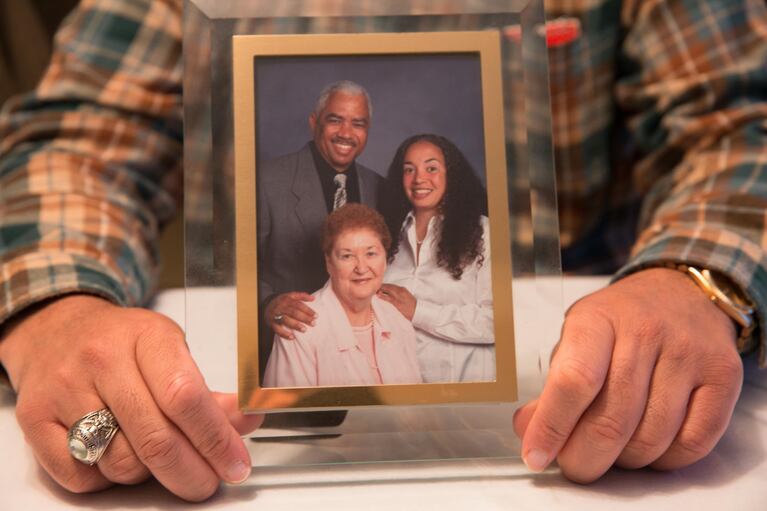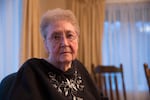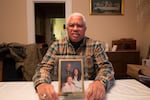
Alan Batts holds a family photo of him with his sister, Karen, and his mother, Elizabeth. Karen Batts died homeless on Portland's streets Jan. 7, 2017, during a winter storm.
Amelia Templeton / OPB
The Portland Police had placed a mental heath hold on a homeless woman and taken her to a hospital two months before she died of hypothermia in a downtown parking garage.
Karen Batts is among four people living on the streets in Portland who have died of hypothermia in the first few weeks of 2017.
Much of the reporting following Batts' death has focused on her eviction four months earlier, but her family has said their difficulty compelling her to get mental health treatment and social workers' failure to share information with them contributed to Batts' death.
Batts' family and the managers of the affordable housing complex where she lived had all tried to get her medical care in the months before she left, but they say Batts refused treatment and repeatedly did not meet the standard for a mental health hold.
Related: Homeless Portland Woman Who Died Suffered From Schizophrenia
What her family did not know is that she was finally admitted to a Portland hospital not long before she died.
The Portland Police responded to a call about a woman in traffic Nov. 3 and found Karen Batts standing at the intersection of West Burnside and Broadway street.
She was barefoot, covered in bruises and drinking little bottles of hand sanitizer. She told them it was to keep her mouth clean.
She couldn’t tell officers where she lived or where her family was, so the officers put a mental health hold on her and drove her to Legacy Good Samaritan Hospital.
“Ms. Batts was unable to care for herself and had put herself in grave danger,” officer Ryan Derry wrote in a hospital admission document. “When contacted, she was unaware where she was and did not believe we were the police.”
It’s not clear what happened to Batts at the hospital or under what circumstances she left. Her family and the managers of the public housing apartments she was evicted from had repeatedly tried to get her to seek medical care in 2016.
Two months after her admission to Good Samaritan, first responders again responded to a call about Batts.
She died on a Saturday. It was 24 degrees and snowing. She was in a parking garage downtown when an attendant spotted her removing some of her clothes. That's a sign of hypothermia and also schizophrenia. By the time help arrived, she was nonresponsive.
The house Batts grew up in is on a quiet street just a few miles away from that parking garage.
“I remember the last time I saw her,” her brother, Alan Batts, said.
“She was walking, and she had her fingers in her ears to keep out the noises that were actually in her head,” he said.
Alan Batts said mental illness devastated his sister’s life, and laws meant to protect her privacy contributed to her death.
Karen Batts was 52 years old, and she lived with mental illness for most of her life. It started with anorexia and bulimia when she was a teen. Later, she was diagnosed with schizophrenia. It’s a mental illness that manifests itself in different ways in different people. In Karen Batts, it made her hide from the people trying to help her.
“I’m feeling like god took her home, because she couldn’t care for herself out there any longer,” said her mother, Elizabeth Batts.
Batts' mental illness waxed and waned. In recent years, she’d been doing well. She lived in the same subsidized apartment for seven years. She received a disability check from the federal government every month. She had a Multnomah County social worker and a prescription for Haldol.

Karen Batts, center right, with her family. Batts died Jan. 7, 2017, during a cold winter night in the city. She was homeless at the time of her death.
But about a year and a half ago, Alan Batts said his sister’s life started to unravel.
“I asked her point blank, was she taking her medication? She said no.”
Police records show that around that same time, Karen Batts reported an ex-boyfriend had assaulted her.
She grew paranoid. She stopped answering her phone, disconnected her voicemail. The withdrawal was particularly hard on her brother. He’s just a year older than his sister. They shared a birthday. Their mother called them her almost-twins.
Alan Batts bought his sister a typewriter when she went away to college at Fisk University. She spotted the first gray hair that appeared on his head when he was just 17.
“We were kindred spirits,” he said. “I used to walk her to school, when we first moved here. ”
When his sister lost control over her mental illness, Alan Batts tried to watch over her. He took her to doctor’s appointments. When she disappeared back in 1995, he plastered the city with missing person posters.
Related: 4th Person Found Dead From Hypothermia On Portland Streets
So last year, when she stopped answering his calls and refused to let him in when he came to her building, Batts asked the Portland Police to do a welfare check. He told officers she needed to be hospitalized.
“They knocked on her door, and said she wasn’t a danger to herself or others, and so they couldn’t put her in a hospital,” he said.
Managers at the Oak Street Apartments also started to notice a change in Karen Batts.
“She was a model tenant for many years,” said Martha McLennan, director of Northwest Housing Alternatives, the nonprofit that runs the Oak Street Apartments in downtown Portland.
The apartments are dedicated to seniors and people living with disabilities, including mental illness. McLennan said starting last spring, Karen Batts was involved in a series of disturbances at the building.
She said staff tried to connect Batts with mental health treatment. They called adult protective services and Project Respond, a mobile mental health crisis team.
“There were numerous welfare checks. Numerous knocks on the door to say can’t we please help you,” she said.
According to McLennan, mental health workers evaluated Batts several times to see if she qualified for a mental health hold, but she did not meet the stringent criteria. McLennan said legally, her staff had no way to force Batts to seek treatment.

Elizabeth Batts said her daughter, Karen Batts, should not have died homeless on Portland's streets Jan. 7, 2017. Batts said had she known her daughter was evicted from her apartment, she would have paid the bill to keep her housed.
Amelia Templeton / OPB
The current system for treating people with mental illness errs on the side of protecting patients' civil liberties and privacy, McLennan said, and generally requires people ask for treatment themselves.
“I see situations, not uncommonly, where the person who needs the help doesn’t know how to ask, or can’t ask, or is in no shape to have that realization and ask,” McLennan said.
So in October, after Karen Batts fell two months behind on the rent, Northwest Housing Alternatives evicted her. McLennan said a county social worker was present at the eviction.
“She was asked if she had a place that she was going. She said she did. She was asked if she needed referrals to any services. She said she did not,” McLennan said.
“Nobody reached out to us,” said Karen’s mom, Elizabeth. "Nobody cared about us to tell us what was going on. I mean, why couldn’t somebody tell us something?”
Batts said had she known her daughter was facing eviction, she would have paid her rent.
Her brother, Alan, agrees that was part of what went wrong, and said the family struggled to get information about Karen due to privacy rules included in HIPAA, a health bill passed by congress in 1996.
“We couldn’t talk to anybody unless Karen said it was OK,” he said.
Batts said once Karen was on the streets, it was impossible for him to find her. She avoided homeless shelters and hid from people.
Since the medical examiner came and delivered the news of her death on Sunday, Alan Batts has struggled to sleep.
“I have a lot of different feelings, right now, and throughout the day,” he said.
“I know I’m not a doctor, I know I’m not a nurse, I know I’m not a social worker,” he added. “But I’m supposed to be all of these things in order to take care of her.”




